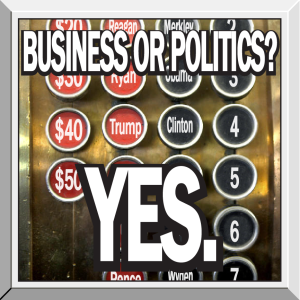One of our clients didn’t think so, but here’s Tom’s view…
 When a client recently asked about our “#NotNormal-RESIST!” bumper stickers, we told her they “were in protest of the new administrations irregular behaviour”. It didn’t sit well. “Politics has no place in your business”, she said. “I’m never coming back here again, and I’m telling my friends to do the same”. Maybe she was right… keeping politics out of business is basic business advice; after all, why give any person any reason NOT to come to your business? Profit is critical in business but some things are just as important as profit. Staying quiet about those higher priorities can border on criminal, especially in today’s world or to protect a dollar. Here’s Tom to explain why he puts his company’s neck on the political chopping block time and again, and why he’s not likely to stop…
When a client recently asked about our “#NotNormal-RESIST!” bumper stickers, we told her they “were in protest of the new administrations irregular behaviour”. It didn’t sit well. “Politics has no place in your business”, she said. “I’m never coming back here again, and I’m telling my friends to do the same”. Maybe she was right… keeping politics out of business is basic business advice; after all, why give any person any reason NOT to come to your business? Profit is critical in business but some things are just as important as profit. Staying quiet about those higher priorities can border on criminal, especially in today’s world or to protect a dollar. Here’s Tom to explain why he puts his company’s neck on the political chopping block time and again, and why he’s not likely to stop…
Greetings,
Here’s a little secret… I was a registered Republican for 20 years before my political awakening. When I started my business 36 years ago I was politically clueless… I didn’t even know the difference between the major parties! After a cursory investigation it seemed Republicans were the party of business and a little business networking seemed to make sense. It was a different time then. I never changed my registration because I was politically inert and was too busy trying to survive in business to care about politics, but around 1998 a co-worker helped direct my available bandwidth to some sources of real news and reporting. That set me on a path to enlightenment and the understanding that my interests would be best served if I woke up.
Reagan understood that people that are ill-educated, poor and over-worked seldom cause political ripples. He famously stated the reason he opposed free education: “why would I want to pay to educate people who would oppose my policies?” The decline in availability and quality of free public education, the “dumbing down of America” brings with it many slow insideous side effects and has led to the decline of Democracy. Civics and History are critical tools in the fight for political self-determination, but it seems we are no longer citizens and have become just people-that-live-in-America. “Citizens” should not be just passive residents in a society; the role of “citizen” obligates us to participate in creating the society we want.
I’m not a Republican OR a Democrat and I think my beliefs are widely shared by the people of (if not the leadership of) both parties. Both of the major parties have lost their way. The two party system is broken; The Republican leaders have fallen off the right side of the political landscape and the Democrats are no longer the opposition party. They have become Republican-lite and with very few exceptions mirror the Republicans subservience to the Corporate donors that now rule our failing country.
We are no longer “#1!, #1!, #1!” unless you are refering to poverty, hunger, infant mortatily, bloated military, crumbling infrastructure or any of the other sad realities that we now lead in. I believe that government should work for the poor, the middle class, and the wealthy alike. I want a society that cares for its members and protects the commons, and I believe in the basic principles of accountability, freedom, and rule of law that people have died for for more than two centuries. I believe that corporations should not have the rights of people and that they have far too much control over our society. I think we do better as a country when everyone plays by the same rules.
With all the years I’ve put into Tom Dwyer Automotive Services it would have been impossible to keep my views out of the office even if I tried. For example, like every business we’re asked to sponsor many worthy causes. We obviously can’t support them all, so I choose what I think are important issues like single-payer health care or climate change. You’d get bored if our newsletter was about cars month after month so we try to bring you information on topics like police militarization or the federal budget. When our company chose to advertise we picked a fledgling Progressive station as an alternative to the Rush Limbaughs of the world, and instead of driving clients away the response was very positive.
Business has always been tied to politics… the titles “Merchant Prince” and “Robber Baron” have a long history. The British East India Company played quite a role in our country’s earliest days, and “What’s good for GM” was once assumed to be good for the country. Standard Oil at home, United Fruit in Central America, and Halliburton in the Middle East are three notorious names in global politics. Fossil fuel companies lobby for laws to continue profits even as the planet melts down while ALEC now puts lobbyists in the position of actually writing bills. The closely held religious views of Hobby Lobby and Chick-fil-A influenced recent decisions at the Supreme Court. BIG businesses have never shied away from politics even when they were being quiet about it, but for SMALL business silence has always been the rule.
That’s been changing for a while. Local Chambers of Commerce never go beyond local politics and the NFIB seems to use small business as a fig leaf to advance big business agendas, but the evisceration of Main Street and the Middle Class have forced small businesses into politics for self-defense, if nothing else. Groups like the Main Street Alliance and National Small Business Association give small companies a way to bind together on issues bigger than their own industry or business district. Increasingly, small businesses aren’t waiting to bind together but are taking stands on their own. Individual small business voiced concerns throughout the Obama administration, and Trump’s recent travel ban prompted thousands of small businesses to close in protest. More and more businesses are putting up signs, or making donations, or hosting events that resonate with their own ideas of politics.
And customers seem to like it. The sterile, bland, and impersonal service at large companies comes from searching for a common denominator between ever-larger swaths of the population. Smaller companies serve their smaller niches more responsively, and so have more room to add distinct personality to their businesses. This gives their customer an advantage. Rather than patronizing some Big Gray Company with an obscure agenda the customer may not agree with, they know what the company stands for and can choose to support them… or not. Politics in business is a two-way street; a company can speak out but they’ll have to stand by it when their customers vote with their dollars.
I think politics does play a role in business but not a primary one. I don’t push or preach politics and many clients don’t even notice or care, and that’s as it should be. No company should offer products, services, or employment based on a political stance. Our shop isn’t a political indoctrination facility for our employees or our clients; we don’t hire people based on their t-shirts or decide which cars to service based on their bumper stickers. If Rush Limbaugh lived in Portland we’d proudly give his vehicle the same care and attention we gave Thom Hartmann when he lived here. 
Yes, politics is important and I don’t shy away from it, but I run a business. I will never forget that our most important goal is our core mission statement: To deliver our clients impeccable, professional service beyond the rest of the industry while taking the best possible care of the people that make Tom Dwyer Automotive Services possible. I started working for myself in 1981 after my last-ever employer asked me to perform unnecessary work on a customer’s vehicle. After pushing back unsuccessfully the wheels on my tool box went into action and I’ve never looked back.
Take care and make a great day
Digging Deeper…
The Politics of Small Business, National Small Business Association, Jun 2012
Why Businesses Should Think Twice About Getting Involved in Political Issues, by Carol RothEntrepreneur.com, Apr 2015
Should Companies Take a Political Stand? by Simon Collins on BoF, Apr 2016
Getting Political Can Cost Your Business Dearly If You’re Not Cautious by Jayson DeMers in Forbes, Feb 2017
STUDY: The Public Wants Its Brands to Get MORE Political by Patrick Coffee in AdWeek, Nov 2014
Corporate Political Activism: Why Corporations Are Taking Political Stands More Than Ever by Daniel Korschun on the Drexel University News Blog, Jun 2016
Boycott Of Trump-Friendly Businesses May Be Having An Effect by CBS-SFBayArea, Feb 2017
Tech Companies Unite Against Trump Immigration ban by Elizabeth Weise in Milwaukee Wisconsin Journal Sentinel, Feb 2017
Yemeni Small Business Owners In New York Stage Protest Against Trump Travel Ban by Susan Adams on Forbes.com, Feb 2017
Businesses Must Make a Stand on Important Social Issues by Peter Gasca on Entrepreneur.com, Apr 2016
More Companies Taking Stands On Political Issues by Frank Witsil in the Detroit Free Press, Jan 2017
Mix Business With Politics? It’s OK With Most Folks, But Consider These 5 Things by Kent Hoover on BizJournals.com, Oct 2014
Here Are The Most Polarizing Political Decisions That Companies Made Last Year by Maxwell Tani in Business Insider, Jan 2016
Companies Are Speaking Out On Social Issues And Getting Results by Sarah Halzack and Drew Harwell in the Washington Post, Jul 2015
VIDEO: Should Companies Take A Stance On Political Issues? FOX Business, Nov 2014
Should Small Business Owners Preach Politics? by Hank Gilman on Forbes, Nov 2015










